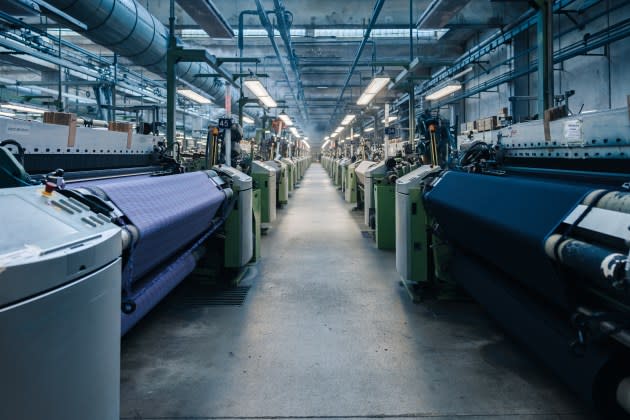Supply Chain’s Sustainability Progress to Be Discussed at Sophomore Venice Sustainable Fashion Forum

MILAN — The sophomore edition of the Venice Sustainable Fashion Forum will place an even greater focus on the transformation of the sustainability-geared supply chain.
The summit, which will take place at Venice’s Giorgio Cini Foundation on Oct. 26 and 27, is titled “Boosting Transition” and is organized by Sistema Moda Italia, Confindustria Veneto Est and consultancy The European House — Ambrosetti.
More from WWD
Camera Nazionale della Moda Italiana, which supported the event last year, is no longer involved.
The two-day event is poised to try and unpack the ongoing eco-journey for the sector, with an agenda molded around the findings of the most recent survey conducted by The European House — Ambrosetti. The latter, also in its second edition, assessed about 2,700 Italian and European fashion companies from a sustainability perspective and especially 374 Italian supply chain entities across 40 key eco principles.
“Hosting a second edition is testament to the fact that the exploration of this subject is all but completed,” said Sergio Tamborini, president of SMI, the association of about 50,000 fashion and textile companies. “I think no sustainable advancement can be achieved without putting the supply chain under the spotlight. Brands which are directly ‘speaking’ with consumers can act as loudspeakers and motivators but at the end of the day fashion is products, so it’s about the amount of material things that are produced and used globally,” he said, emphasizing the pivotal role played by manufacturing players.
The European House — Ambrosetti study, which will be fully unveiled at the forum, highlights how the 100 most prominent fashion companies in Europe have improved their ESG performance by 17 percent in the year since the previous report, a positive advancement, according to Carlo Cici, partner and head of sustainability practices at the consultancy. However, the best-in-class firm, whose name was not disclosed, only meets 70 percent of the desirable criteria.
“The sector’s moving swiftly but it started far behind,” Cici said, explaining how the forum will highlight the long way to go for the sector to complete its sustainability overhaul.
To be sure, according to Flavio Sciuccati, partner at The European House — Ambrosetti and director of the global fashion unit, as a sector generating 3 trillions euros in global sales across positionings, sustainability-wise fashion is lagging behind compared to other, smaller industries, such as electronics and automotive, which generate 1 trillion and 1.5 trillion euros in revenues, respectively.
“Fashion is often defined by [consumer-facing] brands, but the supply chain is where the most action is and can be made. The pipeline is oftentimes long and slow and delocalized,” Sciuccati said. Going through the event’s agenda — which includes panels on topics such as circularity, social responsibility and consumer behavior, the role of financial partners and the value chain — Sciuccati said that one of the main goals of the forum is to come up with proposals on how to tackle the sustainability transformation effectively.
In addition to its relevance sales-wise, Tamborini highlighted how about 15 percent of the world’s working age population is employed in textile and fashion or fashion-adjacent jobs, making a transformation even more crucial in the current context. Particularly in Italy, where the ecosystem is made up of small and-medium-sized enterprises often devoted to manufacturing high-end fashion, sustainability is a competitive driver, sometimes hard to scale, the executive offered.
The size of Italian companies is in fact a debated issue, and a key topic to be discussed at the forum. In the aftermath of the pandemic, several financial and industrial players have come to the forefront of dealmaking, gathering smaller manufacturing players under multiple financially strong umbrellas.
“Without the right financial size there’s little chance Italian companies will be able to unlock the R&D aimed at advancing the supply chain,” Tamborini said. “The smaller-sized Italian firms have little to no ability to take risks.”
Although the list of speakers is still a work in progress, organizers said confirmed panelists include Yoox founder and chairman of King Charles’ Fashion Task Force Federico Marchetti; OVS chief executive officer Stefano Beraldo; Matteo Marzotto, president of MinervaHub; Chiara Morelli, sustainability director and supply chain expert at Prada Group; Dounia Wone, chief sustainability and inclusion officer at Vestiaire Collective; Gruppo Florence CEO Attila Kiss; Ercole Botto Poala CEO of Reda, and Eva von Alvensleben, executive director and secretary general, The Fashion Pact, among others.
Best of WWD
